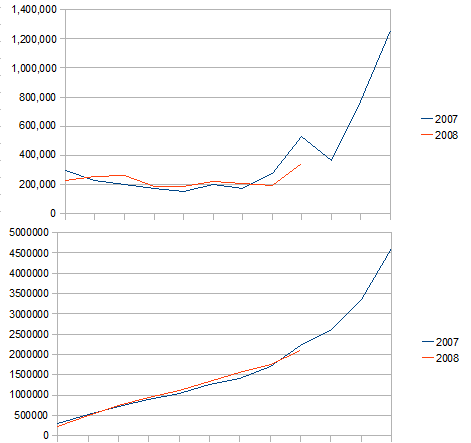Gaborn said:
Wait... are you suggesting that more people are buying 3rd party Wii games because it has MORE 3rd party titles than the 360? Cause that's ludicrous.
I'm saying that if you had 10 skus selling 100 copies combined, then that is less money per publisher than if you had 3 skus selling 100 copies combined.
In one scenario you have $10 per sku, in the other you have $33.3 per sku. In both scenarios you have 100 copies sold in combination.
Ludicrous? Seems like simple math to me. I'm not sure I follow your objection.
And yes, I believe there are vastly more 3rd party games published on the Wii than on either the PS3 or 360. Just because they aren't "Tripple A," noticeable titles for the average GAF reader does not mean that they do not exist, or are not influencing a statistic such as this.
Note: numbers used in this reply are purely for illustration purposes of a concept.
Gaborn said:
What do dollars have to do with sales numbers? NPD gave Nintendo the number of 3rd party games that were sold on Wii. The claim people like making is that third party games don't sell on Wii. This is false.
If we aren't considering dollars earned, then there is no reason to count sales numbers. Sales are about money. Publishers are not interested in winning an arbitrary horse race, they are interested in earnings.
Nintendo used a statistic to show a favorable result in an argument. My statement is that I do not believe that their statistic counteracts the actual criticism being lobbied, and instead manipulates the argument into a position that they can win against. This is hardly a new phenomenon with statistics. Remember - numbers inherently have no power, it is how you use them that gives them substance.
The argument is, as I understand it, where 3rd parties can generate more money. My position is that this statistic does not answer that question for the reasons outlined above.
Gaborn said:
Sony and Microsoft chose to design a console that had a high cost to develop for and they choose the price to sell their games for. I really don't see the relevance of the price, that'd be like saying that PS3 console sales don't count because Sony screwed themselves by releasing a console at $599. The decisions you make determine your success, and this discussion is about whether or not Nintendo has objectively sold more 3rd party games than the other consoles.
You're confusing console success with 3rd party publisher success. No one is arguing that Nintendo has a higher quantity of cumulative software sales. I am simply arguing the relevance of that statistic to a specific third party publisher.
The third parties in question have no vested interest in the success or decline of any manufacturer. They are interested in which opportunity will generate greater returns. I'm saying that a factor in that decision that is not being accounted for is a 20% increase in revenue at similar levels of quantity.
If the only argument being made is whether or not third party games, as a cumulative whole, sell a larger amount of copies on a given console, then I fail to see either the relevance or the purpose of this debate, as it neglects the relevant factors outlined above.
I had assumed that the underlying motif was to illustrate that publishers would find more success on the Nintendo Wii than they would on alternative platforms. It is as an answer to this particular argument that I am objecting to the statistic being used.
Gaborn said:
Just to expand on what I was saying, revenue is also a bad statistic because it's virtually impossible to calculate COSTS associated with various games unless they tell us. Companies don't really care about revenue, they care about profit.
This I agree with. It's unfortunate that we do not have the entire picture of these companies' business models to extrapolate. The best we can do is to examine the gross revenue vs. assumed development cost, and further assume that profit structures are similar, or at least comparable, on a percentage-based calculation per title across machines.
With this in mind, it is important to note that for each 1million copies sold, you have accumulated an additional 10million dollars in gross revenue.
Following this model, it is easy to see how games which are large successes of millions of copies sold can end up generating higher profits by selling at the 20% increase in retail price than they would have otherwise, despite the investment increase, since the difference in budget is negated rapidly by additional revenue flow. For example - at 3 million copies sold, the increase in revenue is 30 million dollars, for example, which most likely outstrips even the most aggressive development investment increase.
In other words, it is my belief that this will be a relevant factor towards the profit structure and should not be ignored as frequently as it is.
Note that I am not saying that the interpretation that these higher cumulative unit sales result in higher profits per publisher involved is fundamentally incorrect, I am simply stating that the provided statistic does not answer the question being posed.





